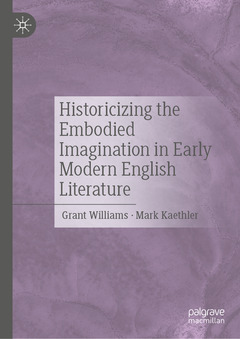Historicizing the Embodied Imagination in Early Modern English Literature, 2024 Unruly Images
Coordonnateurs : Kaethler Mark, Williams Grant

This edited collection reconnects the literary imagination to the early modern cognitive environment. Under the spell of post-romantic aesthetics, modernist criticism regarded the imagination as an autonomous driver of artistic production and severed its dense ties to the image, reducing the latter to a formalistic category emptied of psychological significance. But early modern writers and thinkers did not hold such views. They understood the literary image to issue from the embodied mental faculties of the author and, through its rhetorical inscription, to influence, in turn, the interiority of the reader. For both authors and readers, then, engaging with images was not a detached aesthetic experience; it was a psycho-physiological struggle fraught with ethical peril insofar as the imagination was known for its volatility and unruliness, susceptible to the dysfunction brought on by disease and bearing, at times, in Protestant England the taint of superstition and idolatry. This volume accordingly investigates the imagination?s alliances, altercations, and betrayals with rival cognitive operations based upon premodern faculty psychology.
Mark Kaethler is Academic Chair, Arts, at Medicine Hat College, Canada, and Book Review Editor for Early Theatre. Mark is the author of Thomas Middleton and the Plural Politics of Jacobean Drama (2021) as well as a co-editor with Janelle Jenstad and Jennifer Roberts-Smith of Shakespeare’s Language in Digital Media: Old Words, New Tools (2018). Their work has appeared in Shakespeare, Early Theatre, The London Journal, Literature Compass, and other publications.
Grant Williams is an Associate Professor of English Literature at Carleton University, in Ottawa, Canada, where he teaches early modern English literature and Shakespeare. With William E. Engel and Rory Loughnane, he has co-authored the critical anthologies The Memory Arts in Renaissance England (2016) and The Death Arts in Renaissance England (2022). With Donald Beecher, he has edited Henry Chettle’s Kind-Heart’s Dream and Piers Plainness: Two Pamphlets from the Elizabethan Book Trade (2022) and with William E. Engel, he has edited Shakespearean Death Arts: Hamlet among the Tombs (2022).
Date de parution : 08-2024
Ouvrage de 398 p.
14.8x21 cm
Thèmes de Historicizing the Embodied Imagination in Early Modern... :
Mots-clés :
Imagination; Early Modern Literature; Cognition; Embodiment; Memory; Reason; Faculty Psychology; Drama; Poetic Image; Phantasm; Shakespeare; John Donne; Spenser


